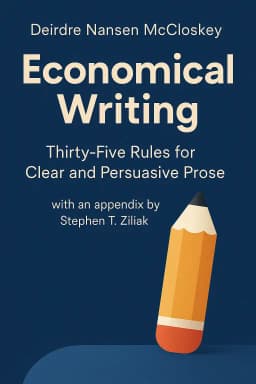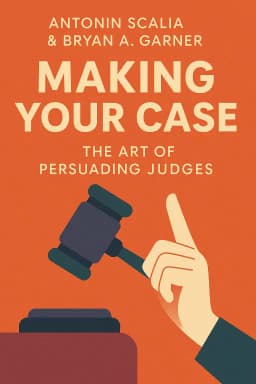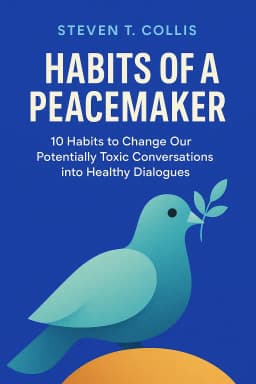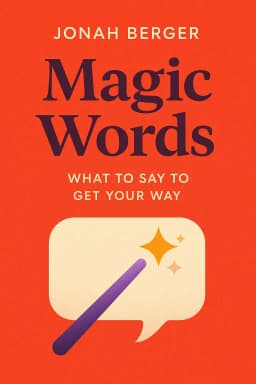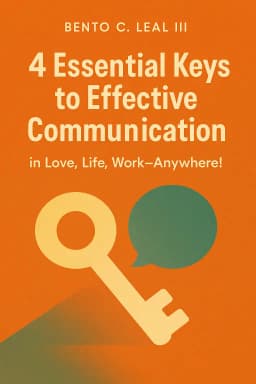
The Secret to Being Heard
Golden Hook & Introduction
SECTION
Michelle: Most communication advice is wrong. It teaches you what to say. But what if the real secret to being heard is a skill you practice before you even open your mouth? A silent, internal shift that changes everything. Mark: A silent skill? That sounds… counterintuitive. I thought communication was all about words, about having the perfect comeback or the most logical argument. Michelle: Exactly! And that's the core idea in a really powerful little book we're diving into today: 4 Essential Keys to Effective Communication in Love, Life, Work—Anywhere! by Bento C. Leal III. Mark: Bento C. Leal... not a household name I recognize. What's his story? Michelle: And that's what makes this so compelling. He's not some corporate guru or academic researcher. For decades, he's been a full-time communication skills instructor, working with a non-profit in the Bay Area. He teaches these skills in community centers, county jails, and even federal prisons. Mark: Whoa, hold on. Jails and prisons? So this isn't just theory for the boardroom. He's seen this work in some of the toughest, most high-stakes environments imaginable. Michelle: That’s the point. He’s working with people where a single misunderstanding can have massive consequences. It grounds his entire approach in a raw, undeniable humanity. And it all starts with that silent skill you were skeptical about. Mark: Okay, I'm intrigued. A communication expert who works with inmates has my attention. So what is this foundational, silent skill?
The Foundational Mindset: Empathic Awareness as the 'Why'
SECTION
Michelle: He calls it the Empathic Awareness Skill. And the best way to understand it is through the author's own personal, and very humbling, epiphany. Mark: I love a good origin story. Lay it on me. Michelle: Leal writes that for years, he thought he was a great listener. He was trained in it, he taught it. But one day, he was talking with a friend who was really excited about a new project at work. And as his friend was talking, Leal realized… his mind was completely elsewhere. Mark: Oh, I know that feeling. You're nodding, making the right "uh-huh" sounds, but your brain is making a grocery list or replaying a different conversation. Michelle: Precisely. He was going through the motions. But then he had this moment of brutal honesty with himself. He stopped and asked, "Wait a minute… do I really care about what he’s saying?" Mark: Ouch. That's a tough question to ask yourself about a friend. Michelle: It gets deeper. He realized the answer was, in that moment, no. And that led to an even bigger question: "How much do I really care about this person if I can't even give him a few minutes of my undivided attention when he's sharing something important to him?" Mark: Wow. So the problem wasn't his listening technique. The problem was his internal state. He wasn't valuing the person in front of him. Michelle: That was the epiphany. He realized that all the listening skills in the world are useless if you don't first have this foundational mindset of genuinely valuing the other person as a unique, important human being. You can't fake genuine interest. Mark: Okay, but 'valuing others' sounds a bit... fluffy. How is that a skill? Isn't that just a feeling you have or you don't? Michelle: That’s the critical distinction Leal makes. He argues it is a skill, something you practice and cultivate. He breaks Empathic Awareness down into four concrete steps. The first one is the most surprising. Mark: What is it? Michelle: It's to recognize your own inherent value and dignity first. Mark: Wait, to be a better listener to others, I have to start with myself? That seems backward. Michelle: He uses the classic airplane analogy: you have to put on your own oxygen mask first before you can help anyone else. He says if you don't believe you are unique, special, and valuable, it's almost impossible to genuinely extend that belief to others. It starts with self-worth. Mark: I can see that. If you feel worthless, you might be judging others, or competing with them, or just not have the emotional capacity to truly be present for them. Michelle: Exactly. So, Step 1 is value yourself. Step 2 is to consciously practice seeing that same value in others. See them as a special individual, worthy of respect. Step 3 is to use that feeling to create the desire to listen and relate. And Step 4 is to actively think of the positives in your relationship with that person. It's an internal workout. Mark: So you're basically putting on 'empathy glasses' before the conversation even starts. You're priming your brain to care. Michelle: You're priming your brain to care. It's the 'why' behind the 'how.' Without this internal foundation, everything else is just an act. And people can always, always sense when you're just acting. Mark: That's so true. You can feel it when someone's not really with you. It's a terrible feeling. Okay, so you've done the internal work. You've put on your empathy glasses. How does that change what you actually do when someone is talking?
The Practical Toolkit: From Listening to Dialogue
SECTION
Michelle: It changes everything. Once you have the 'why' of Empathic Awareness, you can move on to the 'how' of Empathic Listening. And a huge part of that is recognizing what Leal calls 'Listening Blocks.' Mark: Listening Blocks. I have a feeling I'm guilty of a few of these. Michelle: We all are. There's 'Mind Reading,' where you assume you know what they're going to say. There's 'Rehearsing,' where you're just planning your brilliant response. And my personal favorite, 'Advising.' Mark: Ah, the 'Fixer.' I've been called that a few times. My wife will be telling me about a problem at work, and my brain immediately goes into solution mode. I'm building a whole PowerPoint presentation in my head to solve her problem. Michelle: And she just wants you to listen, right? Leal tells a story about this in one of his classes. A woman finally turned to her husband, a pastor, and said she was tired of talking to him because he was always finishing her sentences. He was stunned. He thought he was being helpful, showing he was on the same page. Mark: But he was actually taking her finish line away from her. He was making her story his. Michelle: Exactly. These blocks prevent us from actually hearing what's being said. The core of Empathic Listening is to quiet your mind, listen fully, and most importantly, listen through the words to the feelings underneath. Then, and this is the crucial step, you say back what you heard. Not to judge it, not to fix it, but just to confirm you understood. Mark: That sounds like it would slow conversations down a lot. "So what I'm hearing you say is..." It can feel a bit like therapy. Michelle: It does slow things down! And that's the point. Leal's most powerful argument is that you have to 'slow down to speed up understanding.' He tells this incredible story from one of his workshops. Mark: Let's hear it. Michelle: He asked the couples in the class to pick a minor, unresolved issue and practice Empathic Dialogue—taking turns speaking and then reflecting back what they heard. One couple chose an issue they had been arguing about for five years. Mark: Five years. That's not a minor issue anymore. That's a permanent house guest. Michelle: Right? So they start the exercise. The husband speaks, the wife reflects it back. The wife speaks, the husband reflects it back. They go back and forth. And after about 20 minutes, the husband looks up at Leal, totally amazed, and says they'd just solved it. Mark: Wait. Five years of fighting, solved in 20 minutes of structured talking? That's insane. It sounds like magic. Michelle: The husband said the same thing. He complained, "But this took so long!" And Leal's response was perfect. He said, "Yes, but you've been doing it your way for five years and gotten nowhere. How do you feel about the 20 minutes now?" It's a perfect illustration that what feels inefficient in the moment—truly listening—is actually the most efficient path to resolution. Mark: That story is a game-changer. It reframes the whole purpose of these skills. It's not about being polite; it's about being effective. But what about when you're the one who's upset? It's hard to be an empathic listener when you're angry. Michelle: That's where Empathic Speaking comes in. And he has a brilliant, simple tool for this called the XYZ Statement. It’s a formula for expressing yourself without attacking the other person. Mark: Okay, I need this. What's the formula? Michelle: It's: "When you did X (a specific behavior), in situation Y (the context), I felt Z (your emotion)." Mark: Give me an example. Let's say my partner was late and didn't call, and I was worried. Michelle: The typical, accusatory way might be, "You're so inconsiderate! Why didn't you call? I was worried sick!" That immediately puts them on the defensive. Mark: Right. And then we're fighting about my accusation, not about the actual issue. Michelle: But with the XYZ statement, you'd say: "When you didn't come home when you said you would tonight (X and Y), I felt really worried (Z)." Mark: Huh. That's completely different. It's not an attack. It's a statement of fact about my feelings. They can't really argue with how I felt. It opens a conversation instead of starting a fight. Michelle: That's the entire goal. It separates the person from the problem. You're not saying "You are a bad person." You're saying "This specific behavior had this specific effect on me." It's a tool for clarity, not for combat.
Synthesis & Takeaways
SECTION
Mark: It seems like all these tools—the listening, the XYZ statements—they're all just ways to put that initial Empathic Awareness into action. They're the 'how' to the 'why' we talked about at the beginning. Michelle: Exactly. The genius of this book, which has won awards for its practical advice, is that it's not just a collection of tips. It's a system built on a single, profound truth: effective communication isn't about transmitting information, it's about affirming value. Mark: Affirming value. I like that. It’s about making the other person feel seen, heard, and respected. Michelle: Yes. And when you make someone feel truly seen and heard, the problem-solving almost takes care of itself. The defensiveness drops, the walls come down, and you can actually connect as two people trying to solve a problem together, instead of two adversaries trying to win. Mark: And for anyone listening who wants to try this, it's not just theory. You mentioned he has a practical component? Michelle: He does. The book ends with a "12-Day Communication Challenge." It's a daily workout plan to build these communication muscles, focusing on one small skill each day. Leal knows that practice makes permanent, so he gives you a structured way to turn these ideas into habits. Mark: That's fantastic. It takes it from an interesting concept to an actual life practice. It really makes you wonder, in your next difficult conversation, what would change if you focused first on valuing the person, not on winning the argument? Michelle: A question we could all stand to ask ourselves more often. Mark: This has been incredibly insightful. A simple, powerful framework for something we all do every single day. Michelle: This is Aibrary, signing off.
